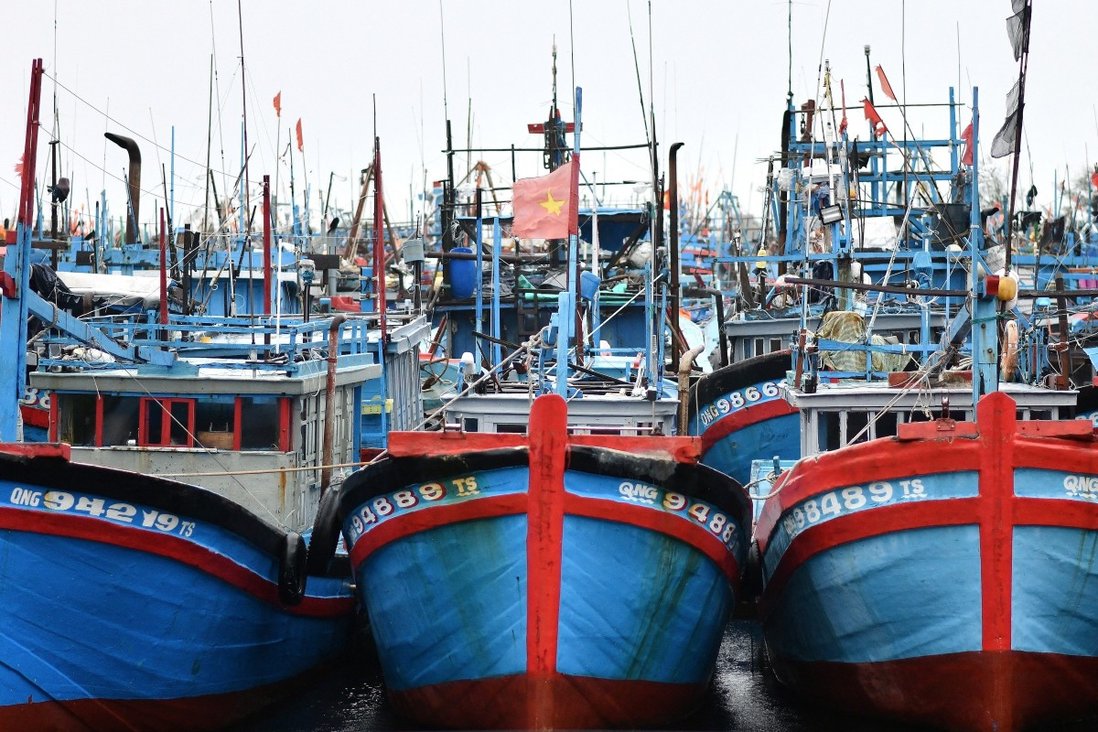www.aljazeerah.info
News, April 2021
Archives
Mission & Name
Conflict Terminology
Editorials
Gaza Holocaust
Gulf War
Isdood
Islam
News
News Photos
Opinion Editorials
US Foreign Policy (Dr. El-Najjar's Articles)
www.aljazeerah.info
|
Editorial Note: The following news reports are summaries from original sources. They may also include corrections of Arabic names and political terminology. Comments are in parentheses. |
South China Sea:
Vietnam building up its maritime militia, magazine says
SCMP, April 25, 2021
By Liu Zhen in Beijing
 |
|
| Vietnam passed a maritime militia law in 2009, April 25, 2021 |
South China Sea: Vietnam building up its maritime militia, magazine says
Activities in waters near Hainan, Paracel and Spratly islands have ‘threatened China’s maritime law enforcement and national defence security’, Naval and Merchant Ships says Matter must be ‘taken seriously and dealt with in a timely manner’, it says
Vietnam passed a maritime militia law in 2009. Photo: AFP Vietnam is building up its maritime militia in the South China Sea in an apparent challenge to Chinese efforts to dominate the disputed waterway, according to a Chinese military magazine.
Beijing claims almost all of the South China Sea as its sovereign territory, but Hanoi is one of several rival claimants. Like China, the Southeast Asian country has a long tradition of using its maritime militia to defend its claims.
“Vietnam’s maritime militia force and their activities in waters near Hainan, the Paracel Islands and Spratly Islands have threatened China’s maritime law enforcement and national defence security,” Naval and Merchant Ships magazine said in an article published last week.
The matter must be “taken seriously and dealt with in a timely manner”, it said.
Diaoyu-Senkaku islands spat deepens as Japan warns China over coastguard ships in East China Sea
Vietnam passed a law in 2009 that authorises its maritime militia to conduct sea patrols and surveillance, and confront and expel intruding foreign vessels in defence of Vietnamese-controlled islands and reefs.
While the European Union has estimated that about 8,000 fishing boats and 46,000 fishermen are part of Vietnam’s maritime militia, the magazine said the latter figure could be over 70,000. When not catching fish, these trained militiamen took part in a range of missions, sometimes in cooperation with the Vietnamese navy, it said. The missions included covert spying on Chinese military facilities and ships, and sometimes deliberately clashing with Chinese coastguard vessels to attract Western media attention, the magazine said.
This was intended to put the ideas of “humanitarian incidents” and “Chinese coercion” into the minds of the international public, it said.
“The guerilla warfare tactics could offset Chinese law enforcement ships’ advantages in terms of vessel size and technologies … [and] if they get captured, the economic cost is limited but diplomatic and political gain could be huge, so they have little fear,” it said.
Philippine coastguard sends strong warning to Chinese vessels during South China Sea patrol
Philippine coastguard sends strong warning to Chinese vessels during South China Sea patrol
However, some of the tactics were learned from the Chinese, given the two communist countries’ complex historical ties and their shared legacy of guerilla warfare and the concept of a “people’s war”.
Both Beijing and Hanoi have a long history of maritime militia and proficiency in mobilising fishermen and their boats in activities to assert claims in the South China Sea.
Last month, the Philippines accused China of sending more than 200 maritime militia vessels to the disputed Whitsun Reef .
“For China especially, the maritime militia was the precursor to the modern PLA Navy,” said Collin Koh, a research fellow at the S Rajaratnam School of International Studies at Singapore’s Nanyang Technological University.
Similarly, Vietnam’s maritime militia besieged China’s HYSY-981 oil rig in 2014 and had been openly aggressive towards the maritime security forces of other countries, he said.
In 2019, Chinese and Vietnamese maritime militias, working in support of their respective coastguards, clashed near the oil rich Vanguard Bank.
However, Chen Xiangmiao, an associate researcher at the National Institute for South China Sea Studies, said that in recent years Beijing had reduced the involvement of civilians in its maritime disputes, in favour of enhancing its coastguard and other official law enforcement forces.
If fishermen got involved in military activities, they were classed under international law as military personnel and the issue became much more complicated, he said.
“So we are applying controls to fishermen entering the disputed waters of the South China Sea to avoid risk. The coastguard is the most commonly accepted way to establish administration of the waters,” he said.
The magazine article said China should strengthen its legislation on foreign vessels, pressure the Vietnamese government to exercise restraint through diplomatic channels, and increase its coastguard capabilities to deter the militia.
***
Liu Zhen joined the Post in 2015 as a reporter on the China desk. She previously worked with Reuters in Beijing.
***
Share the link of this article with your facebook friendsFair Use Notice
This site contains copyrighted material the
use of which has not always been specifically authorized by the copyright
owner. We are making such material available in our efforts to advance
understanding of environmental, political, human rights, economic,
democracy, scientific, and social justice issues, etc. We believe this
constitutes a 'fair use' of any such copyrighted material as provided for
in section 107 of the US Copyright Law. In accordance with Title 17 U.S.C.
Section 107, the material on this site is
distributed without profit to those
who have expressed a prior interest in receiving the included information
for research and educational purposes. For more information go to: http://www.law.cornell.edu/uscode/17/107.shtml.
If you wish to use copyrighted material from this site for purposes of
your own that go beyond 'fair use', you must obtain permission from the
copyright owner.
|
|
|
|
||
|
||||||


